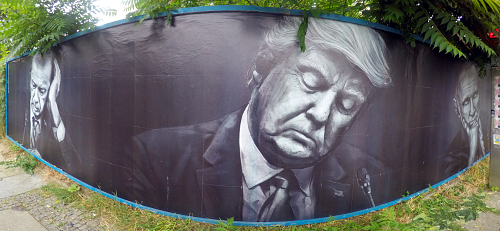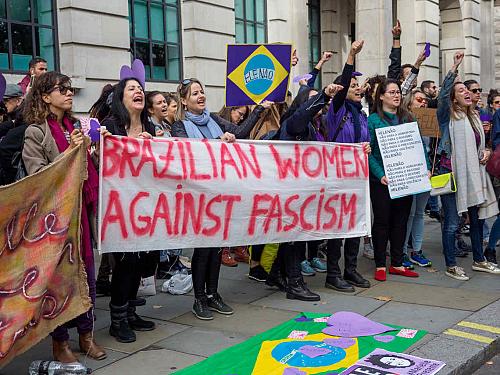On 22 October 2020, 35 countries from throughout the world met virtually for the international signing ceremony of the Geneva Consensus Declaration (Geneva being the planned site of the meeting before it was canceled due to COVID-19). The four cornerstones of this pact were promoting women’s health, preserving human life, reaffirming the family as the fundamental unit of society, and protecting national political sovereignty, particularly in regards to legislation on abortion.
No women’s rights activist was fooled: this was a conservative internationale, joining hands in opposing the right to safe and legal abortion, as well as a conception of women considered first and foremost as mothers, their place being in the home. The Spanish trans philosopher Paul B. Preciado reflects in a Mediapart article: “How is it that States who defend white supremacy signed a declaration with 15 African States? It is not Islamic/Christian opposition that divides the blocs of this new hot war. On the contrary, theologico-political States—whether Catholic [1] or Muslim—that clash in other domains find common ground in misogyny, homophobia, transphobia, and the expropriation of women’s reproductive labor.”
It comes as no surprise that the six countries co-organizing the event were Bolsonaro’s Brazil, Sissi’s Egypt, Duterte’s Indonesia, Orbán’s Hungary, Trump’s United States, and Rugunda’s Uganda. These countries have attracted much international attention in the past few years due to their increasing authoritarianism in addressing social protest. A number of common characteristics have also been pointed out: implementation of ultra-liberal economic policies despite a discourse claiming to defend the popular interest; promotion and political instrumentalization of ultra-conservative forms of religiosity; overt, unabashed, and even proud sexism and LGBTphobia; racism structuring political priorities, whether explicit or implicit. What are the global conditions contributing to the rise of so many ultraliberal, ultraconservative governments? They each have their own characteristics. Here is an overview of the most representative instances of these new authoritarian governments as of late 2020.
In Turkey, the party of Recep Tayyip Erdoğan (Justice and Development Party [AKP]) has been in power since 2002. However, after a decade of relative stability, during which he seemed a kind of “enlightened reformer,” a drift towards authoritarianism began in 2009–2010, manifesting in Erdoğan’s personalization of power. Brutally repressed demonstrations (particularly in Taksim Square and Gezi Park in 2013) and mass arrests to discourage opposition; repeated trials to “purge” institutions (courts, army, civil service, media) and ensure their loyalty; iron-handed imposition of ultraconservative morality; intimidation and censorship of journalists and the press; and increased attacks on Kurdish movements... On 16 April 2017, a referendum he won by a slim margin on the strengthening of presidential powers, gave Erdoğan exclusive executive power and assured his stranglehold on the legislature and judiciary. In this situation, feminists are on the firing line, confronting the State masculinism embodied by Erdoğan.

Viktor Orbán has been Prime Minister of Hungary since 2010. A close associate of the far-right U.S. ideologue Steve Bannon, spouting racist, anti-European rhetoric, he confirmed his turn to authoritarianism with his 2010 media law, which practically put audiovisual media under the control of his party; then, by the coming into effect of the Constitution on 1 January 2012, introducing an electoral reform that would almost systematically ensure his party’s victory. Dóra Papp, a Budapest activist, explains that his government “campaigns on two subjects; anti-immigration and the family,” in particular, “protecting Christian families from multiculturalism,” which is supposedly imported from abroad through the “interference” of the European Union. In fact, this fervent defense of Christianity is a cover for both sending women back to the kitchen, restricting at the same time their sexual and reproductive rights in the name of the national birthrate; and rejecting immigrants, a theme on which he endlessly contributes to the polemic in the European arena. Additionally, organizations that provide aid to immigrants are attacked, libeled, labeled “enemies of the country,” and have their ability to act restricted. [2] In 2018, mobilizations against the Orbán government did not lack for motives: labor code reform, stranglehold on the courts, attacks on progressive universities, rampant corruption [3]… His proud State illiberalism is still wildly controversial in Europe.
In India, the Hindu nationalist party (Bharatiya Janata Party [BJP, Indian People’s Party]) won the majority in the general election of 2014, making Narendra Damodardas Modi prime minister. He enjoys an “image of a strong leader, guiding and protecting the nation against the Muslim external enemy”; many observers explain his reelection in 2019 by his fueling resentment, violence, and “fake news.” Indeed, there is increasing manipulation of social media in India, whether supporting the government, attacking the opposition, or arousing division. While his promises to fight corruption and encourage development (his slogan was “Sabka saath, sabka vikas” [solidarity with each, development for all]) do not seem to have been fulfilled, Modi has, on the contrary, launched massive hate campaigns against the country’s Muslim minority, with a background of xenophobia against Bangladeshi immigrants, labeled “infiltrators” and “termites.” In December 2019 an amendment of the Citizen Amendment Act (CAA) was adopted, establishing religion as a criterion for obtaining Indian citizenship. This new wave of State islamophobia caused an uproar to which the government responded by violence: mass arrests with extremely harsh sentences for students and activists, and discourse associating them with terrorism—helping to delegitimize them in public opinion—threats, intimidation, even torture and murder by the police… Repression was particularly savage in Uttar Pradesh. Meanwhile, unfulfilled economic and social promises continue to roil India, which is particularly affected by famine after the COVID-19 epidemic.
Rodrigo Duterte, former leader of a popular uprising, was elected president of the Philippines in June 2016. Perceived as an outsider and nonconformist, he presented himself as the “new strongman of the Philippines,” exploiting a wave of anger and discontent to raise himself to the heights of power. His vulgar, violent, sexist comments and “man of the people” style appealed to many. Already when he was mayor of Davao, he had turned to a militia supported by the army and businessmen, causing hundreds of deaths. When he took power, Duterte announced his “war on drugs.” What happened, in fact, was a wave of attacks on journalists, union leaders, activists, and other defenders of human rights, particularly members of indigenous communities defending their territories. For instance, on 29 May 2017, he said to human rights defenders: “I’ll kill you along with drug addicts. I’ll decapitate you.” A February 2019 FIDH report says that “President Duterte’s violent rhetoric has created a climate in which attacks against human rights defenders are acceptable and perpetrators are never punished.” Thousands have already paid with their lives for this belligerent and toxic rhetoric. Legal repression is equally vicious, with criminal accusations (often false) against political opponents, particularly against women, with open calls for sexual violence. The Duterte government, with its close ties to the provincial oligarchy, has consistently reaffirmed the neoliberal paradigm: reduced public services; erosion of food sovereignty and ever-limited access to natural resources for peasant communities for the benefit of extractive industries; limitations on labor rights to ensure profits for the elite... A combination of ultraliberal economic policies, indiscriminate use of verbal and military violence, and tighter control of the three branches of power: Duterte seems the very embodiment of the new authoritarian governments that have flourished in the past few years.
The year 2016 was also marked by the election of Donald Trump in the United States. The man needs no introduction: he embodies the racism, antisemitism, misogyny, and xenophobia that enchant some electors. With a strong evangelical fanbase, he campaigned on limiting access to abortion, building a wall to stop Latin American immigration, and fighting “rampant corruption in Washington.” And yet, he constantly hired the very figures who represented corruption in the eyes of many (e.g. Betsy DeVos, the billionaire businesswoman he made Secretary of Education) and his public policies also continued to favor the economic elite. Furthermore, his encouragement of violence among his supporters, often armed to the teeth, against U.S. minorities (Black, Latinx, Native American, LGBTI, etc.) grew particularly strong and dangerous in the last years of his presidency. In 2017, he refused the condemn the killing of a young woman protesting a rally of the KKK and neo-Nazi groups in Charlottesville, granting a kind of legitimacy and impunity to far-right violence. When Black Lives Matter protests began in June 2020, militias sprang up to attack protesters virtually unhindered. On the international level, Trump will be remembered for his trade war against China, nuclear tensions with Iran, withdrawing from the Paris Climate Agreement, moving the U.S. embassy from Tel Aviv to Jerusalem in May 2019 (which did not help peace processes in the region), and pulling troops from Northern Syria, thus allowing Erdoğan to crush the Kurdish People’s Protection Units (YPG) and other Kurdish opposition in October 2019.

Jair Bolsonaro in Brazil is another flagrant example of the convergence of ultraconservatism, violence, and capitalist interests. Elected in 2018 on a groundswell of fake news on social media, anti-corruption talking points, and resentment of Lula and Rousseff’s Workers’ Party, he led the union of “Beef, Bible, and Bullets” (large-scale landowners, evangelicals, and the military). As soon as he was in power, he commemorated with great pomp the military coup d’état of 1964; called for an ideological “housecleaning” of public administrations (against what he called “cultural Marxism”); threatened freedom of speech by attacking journalists and placing the main media outlets under government control; and promoted the interests of agrobusiness and extractive industries by facilitating expulsions of indigenous communities, massive pesticide use, and curtailing worker rights among public servants. Increased use of armed forces in public security operations under the Guarantee of Law and Order decree, as well as the trying of civilians by military tribunal, reflect the intensified militarization of the favelhas and working class neighborhoods. There are also direct or indirect attacks on Brazilian activists, even political assassinations like that of Marielle Franco in 2018: although her actual killers were tried, investigation of those who ordered the attack showed many suspicious connections to the Bolsonaro family. Gilmar Mendes, Federal Supreme Court justice, described as “genocide” against indigenous and Afro-Brazilian communities the response of Jair Bolsonaro’s government to COVID-19 in 2020, coming as it did in addition to his inaction on the Amazon rainforest wildfires of 2019. Many legal experts consider that all critical elements are gathered to qualify this as a crime against humanity: intention, plan, and systematic attack.
Xenophobia, racism, sexism, violence, impunity, ties with the military and collusion with business: these governments seem to harness popular rage and anti-corruption rhetoric, managing to stay in power through exciting resentment, political polarization, and violence against minorities of all kinds. The rise of these neoliberal governments, allies of multinational corporations, ultraconservative and often associated with fundamentalist religious groups, may doubtless be explained by the convergence of factors specific to each society and its sociohistorical and political context: the corruption and political blunders of Lula and Rousseff’s Workers’ Party in Brazil; a kind of blindness of part of the progressive sector of the United States regarding structural racism, particularly after the progress and limitations of civil rights movements; difficulties linked to the post-USSR period in Hungary… However, global factors must not be underestimated, particularly the crisis of globalized capitalism and widespread and increasing precarity in societies throughout the world.
